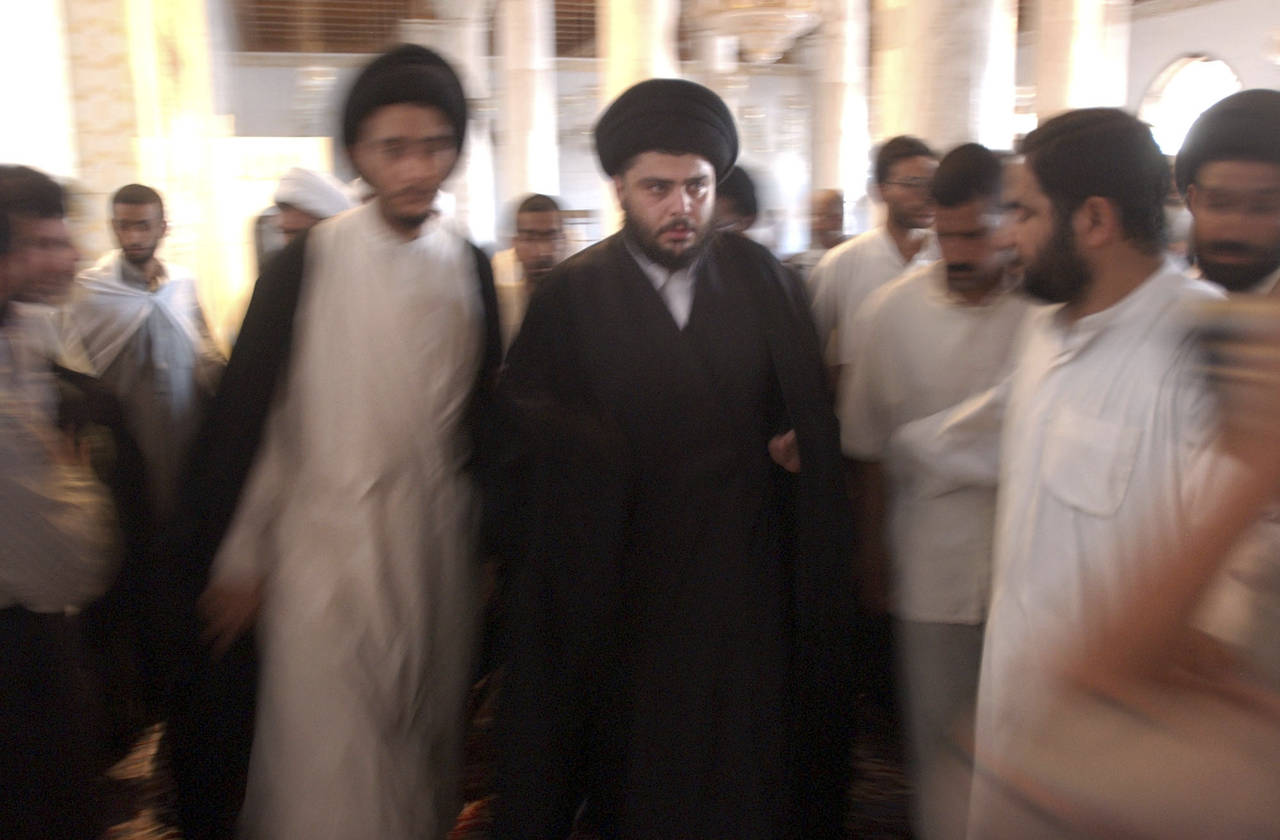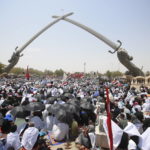EXPLAINER: What spurred the bloody armed clashes in Baghdad?
Aug 29, 2022, 8:18 PM | Updated: Aug 30, 2022, 1:23 pm

FILE - Muqtada al-Sadr is seen during prayers at the Al-Kufa Mosque Friday, July 18, 2003, in the holy city of Najaf, south of Baghdad, Iraq. Al-Sadr is a populist cleric, who emerged as a symbol of resistance against the U.S. occupation of Iraq after the 2003 invasion. (AP Photo/Wally Santana, File)
(AP Photo/Wally Santana, File)
BAGHDAD (AP) — Iraq’s long-running power struggle between rival Shiite camps devolved into bloody street violence this week – the culmination of months of simmering tensions and a political vacuum.
For 24 hours, loyalists of powerful cleric Muqtada al-Sadr transformed the country’s government Green Zone into a front line, trading fire with security forces and rival militias, and bringing the capital to a standstill. Just as quickly, with a single word — “withdraw” — from the cleric in a speech Tuesday, the fighting came to a stop.
His supporters put down their weapons and left.
It was a powerful message to al-Sadr’s Iran-backed rivals and the political elite of the cleric’s enduring power over his hundreds of thousands of followers and an equally dangerous example of the damage they are capable of doing to the embattled country.
Following his calls for withdrawal, Iraqi leaders, including the caretaker premier, expressed their thanks to al-Sadr and praised his restraint.
Al-Sadr has long derived his political influence from his ability to to both command his mass following to destabilize the street, and just as quickly bring them into line. His announcement Monday that he would exit politics showed Iraqis what could happen when that voice of restraint is taken away: chaos, devastation and death.
The protests and heavy clashes that have so far left 30 killed and over 400 wounded may have come to a close, but the political impasse that brought on this chapter of unrest is far from over.
So, what does al-Sadr want and is there an end to Iraq’s crisis?
WHO IS MUQTADA AL-SADR?
Al-Sadr is a populist cleric who emerged as a symbol of resistance against the U.S. occupation of Iraq after the 2003 invasion. He formed a militia, the Mahdi Army, that eventually disbanded and renamed it Saraya Salam — the Peace Brigades.
He has presented himself as an opponent of both the U.S. and Iran and has fashioned himself a nationalist with an anti-reform agenda. In reality, he is an establishment figure with deep influence in Iraq’s state institutions through the appointments of key civil servants.
Al-Sadr derives much of his appeal through his family legacy. He is the son of Grand Ayatollah Mohammed Sadeq al-Sadr, who was assassinated in 1999 for his critical stance against Saddam Hussein. Many of his followers say they are devoted to him because they were once devotees of his father.
Al-Sadr eventually entered politics and garnered a reputation for being unpredictable and theatrical by frequently calling on his followers to gain political leverage over his rivals. His powerful rhetoric infused with religion and calls for revolution resonated deeply with his disenfranchised following.
Through these strategies he has become a powerful player with a fiercely devoted grassroots following concentrated in Iraq’s most impoverished quarters. Most of his loyalists who stormed the Green Zone were unemployed and blamed the Iraqi political elite.
In 2021, al-Sadr’s party won the largest share of seats in October parliamentary elections but not enough to secure a majority in government. His refusal to negotiate with his Iran-backed Shiite rivals on forming a government plunged Iraq into an unprecedented political vacuum now in its tenth month.
WHAT DO AL-SADR’S FOLLOWERS WANT?
The political crisis escalated in July when al-Sadr’s supporters broke into parliament to deter his rivals in the Coordination Framework, an alliance of mostly Iran-backed Shiite parties, from forming a government.
Hundreds staged an ongoing sit-in outside the building for over four weeks. Frustrated when he was not able to corral enough lawmakers to form a government that excluded his rivals, al-Sadr also ordered his bloc to resign their parliamentary seats and called for early elections and the dissolution of parliament.
That call was embraced and reiterated by his following, many of whom have long felt marginalized by the ruling elite.
In Sadr City, the Baghdad suburb where al-Sadr’s followers are highly concentrated, most complain of inadequate basic services, including electricity in the scorching summer heat. The majority have roots in the rural communities of southern Iraq and have little education. Most face enormous challenges finding work.
Most of those who stormed parliament in July and the government palace on Monday were young men for whom it was their first glimpse inside Iraq’s halls of power, where they seldom feel welcome.
Angered by deep class divides and a history of dispossession, al-Sadr’s followers say they believe the cleric will revolutionize a political system they believe has forgotten about them. But in reality, in Iraq’s power-sharing political system, al-Sadr holds significant power and sway.
WHY ARE THE CLASHES SO DANGEROUS?
Monday’s clashes brought Iraq on the precipice of street warfare and was the product of months of political tensions and power struggles between al-Sadr and the Iran-backed Shiite camp over the formation of the next government.
Al-Sadr’s rivals in the Coordination Framework have shown signs they would not be against early elections but both camps disagree over the mechanism. The judiciary has rejected al-Sadr’s call to dissolve parliament as unconstitutional.
With the roots of the political impasse still unresolved, conflict can flare up again. The greatest threat to Iraq’s stability is protracted armed fighting between the paramilitary forces of the rival Shiite camps.
This occurred outside of the capital as the clashes wore on in the Green Zone on Monday night. Militiamen loyal to al-Sadr stormed the headquarters of Iran-backed militia groups in the southern provinces, a move that could have escalated into tit-for-tat attacks as has happened in the past.
It’s a scenario that neighboring Iran, which wields much influence in Iraq, dreaded most. Iranian officials, including Iran’s Supreme Leader Ayatollah Ali-Khamenei, have repeatedly called for Shiite unity and attempted to broker dialogue with al-Sadr. But the cleric has refused, firm in his resolve to form a government without Iran-backed groups.
Members of Iraq’s majority Shiite Muslim population were oppressed when Saddam Hussein ruled the country for decades. The 2003 U.S.-led invasion that toppled Saddam, a Sunni, reversed the political order. Just under two-thirds of Iraq is Shiite, with a third Sunni.
Now, the Shiites are fighting among themselves, with those backed by Iran and those who consider themselves Iraqi nationalists jockeying for power, influence and state resources.
Copyright © The Associated Press. All rights reserved. This material may not be published, broadcast, rewritten or redistributed.

























